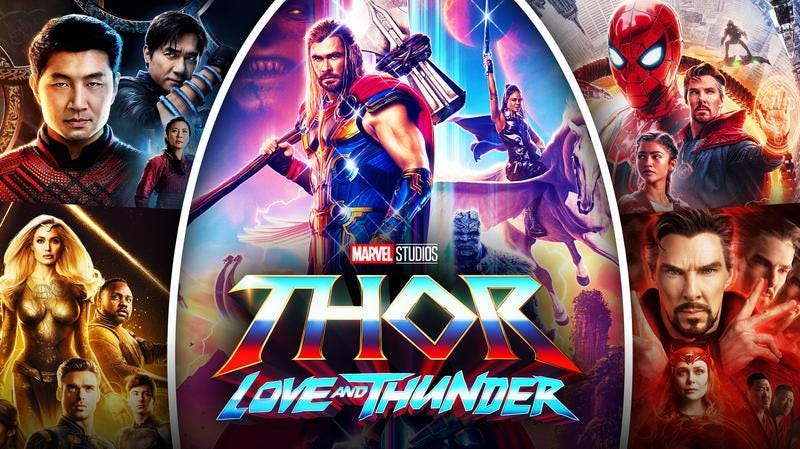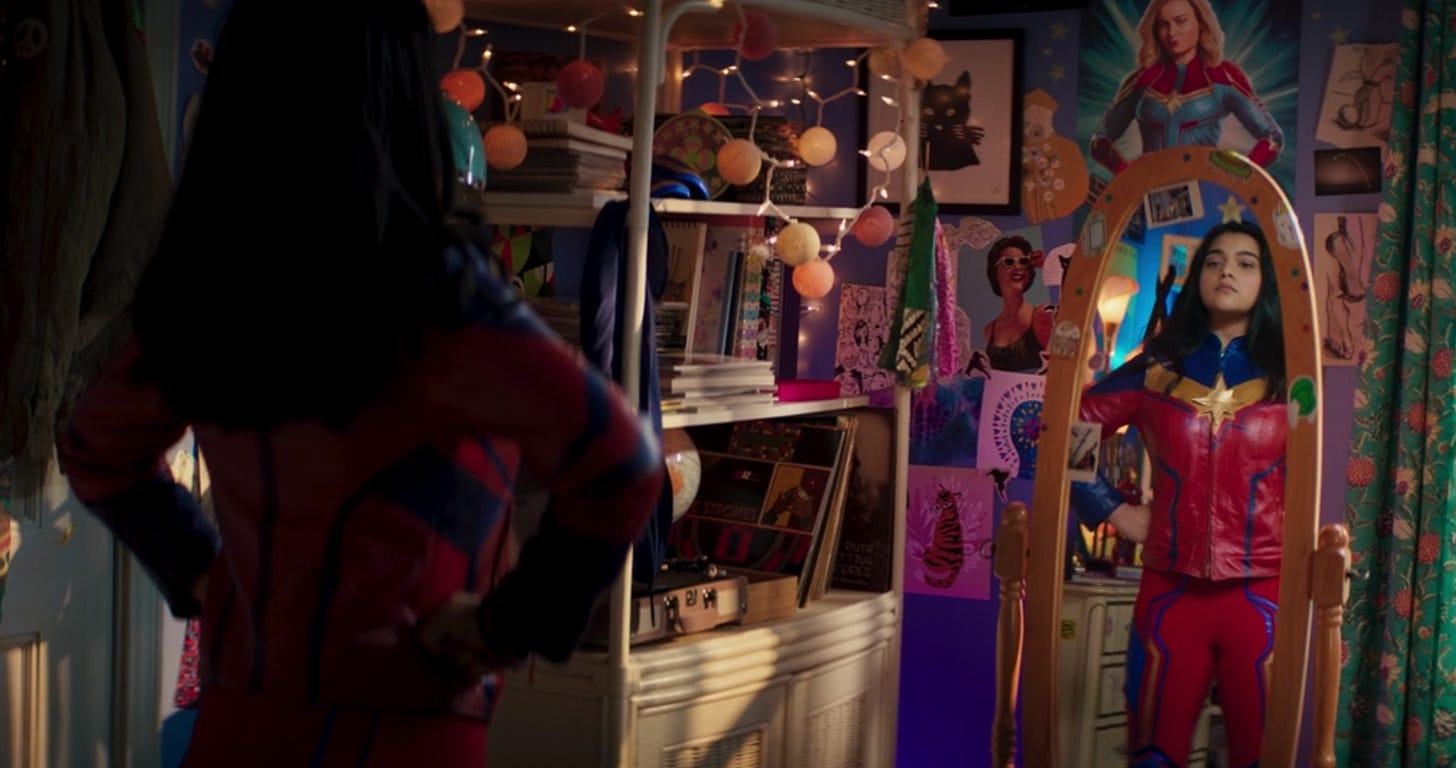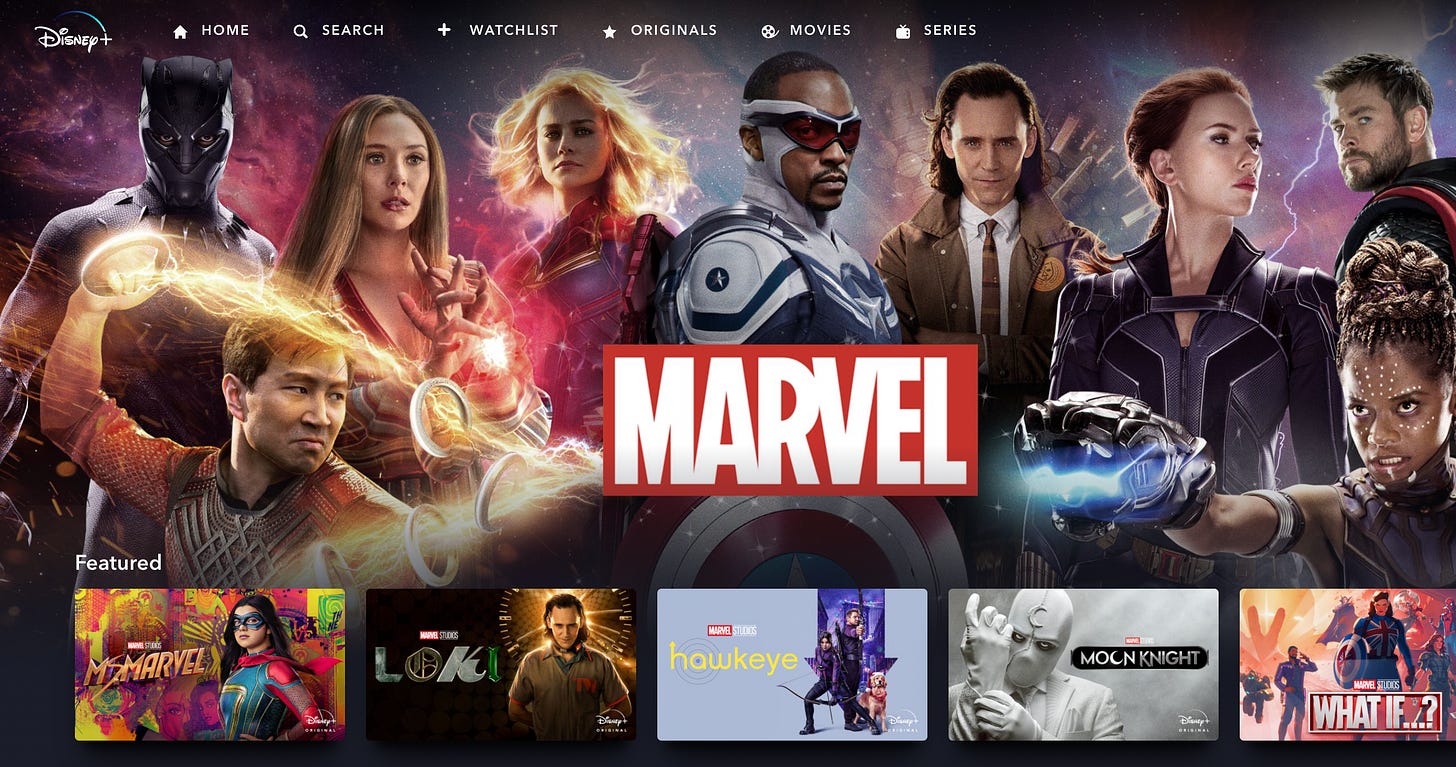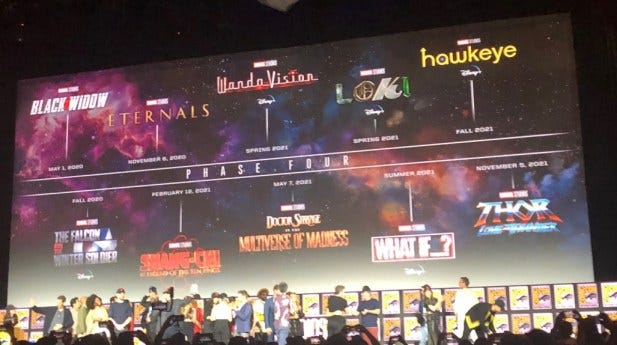Week-to-Week: The MCU is Too Big to Fail, and Too Big to Fix
Thoughts on the state of Phase Four and its most recent theatrical installment, Thor: Love and Thunder
For 11 years, Marvel trained us to engage with the MCU.
In Phase One, they embraced the purity of superhero origin stories, but planted the seeds for their stories to converge, delivering an unprecedented superhero movie moment with The Avengers.
In Phase Two, they started to pick away at the idea of the superheroes introduced in Phase One, through both sequels that explored their flaws and new stories from weirder heroes that expanded the franchise’s tonal boundaries by actively trying to be funny.
And then in the supersized Phase Three, we learned the true potential of this model, with all the origins and sequels converging on an epic Endgame that changed the entire fabric of the Marvel Cinematic Universe, all the while planting new seeds to grow in the future.
But as Phase Four has played out, that initial training has turned into a liability. After a decade of origin stories either being novel or transformative, what is an origin story now when the MCU is no longer working toward a clear goal but also far beyond its nascency? What is a Marvel sequel’s purpose in a context where it’s unclear what role the Avengers have to play in the MCU’s future? And with the TV shows bouncing between epilogues to the Infinity Saga and introductions for entirely new characters, how do you calibrate an audience’s expectations at a stage when many audience members might have been fatigued with the MCU before you massively expanded the amount of content one must consume to “keep up?”
On a personal level, I’ve been more or less content with following Phase Four as a consumer rather than a connoisseur of the Marvel Cinematic Universe. With no comics knowledge to go on, and a job that’s essentially consuming media, the expansion of content has more or less met my level of investment in the MCU where it lives. As a critic and scholar, the questions raised by the introduction of television projects are productive ones, and ones I was excited to explore when I started this Substack and committed to writing about the MCU projects beginning with Ms. Marvel.
But while I’ve adapted to the influx of MCU content in Phase Four and am “caught up,” I have noticed that it has changed my perspective on the MCU as a whole. Whereas I once went into every new project with a clarity about what it was working toward, Phase Four has become untethered, and I find it’s flattened my experience of the franchise. I still made it out to theaters to see every feature film, but my excitement has plateaued instead of growing with each installment. And while I found time to finish every Marvel TV show, few have truly broken free of the constraints of their six-episode runs, with Hawkeye (as an epilogue crossed with an origin story) and Ms. Marvel (as the most successful origin) standing out but not as much as I might like. After three phases of compounding interest, the MCU has settled into a ritual that I’m not close to abandoning, but which has become more of an intellectual exercise as opposed to an emotional investment in the aftermath of Endgame.1
I posed a question related to this in an “Episodic Discussion” among paid subscribers over the weekend, and received a wide range of answers. Some were comfortable with the new normal of content overload in the MCU; others found the increased scale of the MCU risks overwhelming these films as individual stories, a concern that feels especially true as they return to more origin stories after the convergence in Phase Three. Others, meanwhile, felt Endgame was the end of their own journey with the franchise, drifting away either immediately or when they felt that Phase Four wasn’t moving fast enough to clarify a destination for the MCU as a whole.
There was no clear narrative emerging from these comments, because there is—of course—no “generic” viewer when it comes to anything, let alone something like the MCU. We knew from Endgame’s massive box office that there were viewers who had seen maybe only a handful of MCU films experiencing the end of the Infinity Saga. Through heroes with wider recognition like Spider-Man or movies that broadened the audience for the MCU like Black Panther, people gained casual connections to this franchise, and Endgame’s event status no doubt brought many of them into theaters.
But due to a combination of the pandemic-affected box office and Disney+ being opaque about viewing numbers, we really don’t have a clear grasp on what portions of the audience are truly invested in Phase Four. Huge box office results for No Way Home certainly confirmed that there is the potential for mass success, but softer totals for Shang-Chi and Eternals are more of a question mark without the data on how many people have been “keeping up” on Disney+. And this isn’t even bringing the TV shows into the conversation: what percentage of those who saw Multiverse of Madness had finished WandaVision? And who in their right mind didn’t bail after a couple episodes of Falcon & The Winter Soldier? Disney has the data on the average Disney+ subscriber’s investment in the MCU, but is this data they intend to use to plot out which shows are vital to understanding the larger story, or will they operate independent of perceived viewer investment?
My conclusion from all of this thinking, and subscribers’ insightful comments, is that the MCU has become both too big to fail and ultimately too big to fix. This isn’t to say that the MCU is fundamentally broken, but rather that it has evolved into something that is always going to break for some group of people with any given decision. If the origin stories in Phase Four are too tied into the MCU canon, they won’t be a successful onramp for new fans. However, if those origin stories lack enough connection to the MCU’s larger plan, existing fans might bail, which will then create new challenges for filmmakers to find ways to make other projects work for those who failed to do their homework. None of this is going to keep Marvel movies from making hundreds of millions of dollars at the box office, but it is going to create pockets of discontent and disinterest, which is not necessarily “new” for the franchise but comes at a time where it is easier to imagine someone just walking away.
Next weekend at San Diego Comic-Con, Kevin Feige will basically be making his updated pitch for Phase Four, with Marvel returning to Hall H for the first time since 2019 when they laid out the above pre-COVID plan. What he maps out will be the first time, I would argue, Marvel has faced existential questions about the state of the MCU. Will Eternals become the first MCU film not to get a direct sequel?2 Is Feige happy about how the shift to Disney+—which exists primarily in order to bolster Disney’s streaming business—is working creatively? Do they regret leaving Moon Knight untethered from…anything else? As loath as I am to suggest CinemaScores are meaningful, do the B+ ratings for Multiverse of Madness and Love and Thunder give Feige any pause over what expectations people have about MCU-related projects in the post-streaming and post-COVID era? Feige isn’t going to roll into Hall H with apologies or honest reflections on potential missteps, but the choices he presents to fans will perhaps say something about what reflecting he’s been doing behind the scenes.
But nothing he announces will make everyone happy. The decisions that would make me more invested in the MCU would turn others away, and after delivering an unprecedented cinematic climax Marvel and Disney have put themselves in the position of initiating a soft reboot that must somehow still keep everything intact and stable, all while dramatically expanding its scope for business reasons. I still believe there’s a lot of creative potential in what Phase Four is doing, but for the most part I’m convinced that there’s no way that potential will ever be realized in full, forcing us to either accept the compromises—different as they may be for all of us—or disconnect from the franchise that has dominated pop culture conversation for nearly fifteen years.
Episodic Observations: Thor: Love and Thunder [Light Spoilers]
Multiverse of Madness had the clear benefit of being a direct sequel to WandaVision, which helped account for the fact that there was really no reason for Doctor Strange to have a sequel—sure, we get some cursory stuff about his romantic life, but the movie primarily exists to both double down on the multiverse and to tell Wanda’s story. In other words, Doctor Strange is useful more than he is compelling.
By comparison, Thor: Love and Thunder doesn’t have a strong reason to exist on a use-basis other than the character and those around him being compelling. It’s a solid enough story to start with: Jane’s presence in Endgame helped seed the Mighty Thor arc, which does feel like closing a loop of sorts in terms of Thor’s larger arc. But whereas Ragnarok had the novelty of transitioning Thor into the comedy stable of MCU projects, Love and Thunder adds less to the character, and to the MCU as a whole. Christian Bale is compelling as Gorr, but his evil plan just feels like an empty justification for plot to happen, with our heroes jumping from setpiece to setpiece without a whole lot of urgency behind the whole affair beyond a lazy “kids in peril” dynamic.
My biggest issue, though, is how the film struggles to meld Thor’s larger arc and purpose with the comedic tone Taika Waititi had established with Ragnarok. There’s a scene early on with Thor and Sif that is technically supposed to be demonstrating the severity of Gorn’s threat, but it jolts into comedy without warning, and it was jarring and frankly unappealing. The same is true for Natalie Portman’s lack of comic timing: she captures the more contemplative sides of Jane well, but when she’s asked to engage in the one-liners and catchphrases it just doesn’t connect. Ragnarok hid some of its tonal challenges behind its sense of fun and experimentation with a character that had sort of been confined to dour affairs: Love and Thunder’s miscalibrations are harder to justify, and more detrimental to the film as a whole.
This isn’t to say it isn’t fun, or that the core emotional beats of the story don’t land. But at a time when—as noted above—I’m starting to disconnect emotionally with the MCU, to have a film that seemed to be holding me at arm’s length with the chaotic tone became more of a liability than it might have otherwise. And the fact that it offered zero attempt at clarity regarding the rest of Phase Four was maybe my breaking point—even with Comic-Con around the corner, to present a tease for the future that seems wholly about this character and his story just seems like a troll, and so I’m curious to see what type of roadmap we get for this post-credit scene.
I mean obviously I am a media scholar and thus prone to intellectualizing, but the balance used to be better, I swear.
Okay, so Eric Goldman pointed out that technically this title belongs to The Incredible Hulk, but with the Universal rights issues combined with the recasting of it all, I am going to argue that there were too many other variables for that to be a simple decision. I agree with him that if it had been a massive success it might have overcome all of that, but Eternals would be the first project to carry no barriers and yet fail to earn a sequel. My arbitrary distinction stands, damnit.







The funniest dimension of the challenges facing the MCU is that they are the same challenges the comic book industry has been dealing with (often badly) for years (at least mainstream Marvel and DC storytelling). 80 years of Canon means struggling to hold on to readers while attracting new ones... so, a lot of attempts at hard reboots or retellings (e.g., ultimate spiderman), soft reboots with new entry points, or major Events and Crossovers. But the issue of how a given property, story, or character serves the whole is always lurking in the background. It's like the classic comic technique of adding a little note saying 'oh right check out Spidey 67 for this thing you may not have seen happen outside of the avengers.'
This is my biggest complaint about Phase 4. I really enjoyed Wandavision as a sendup of the history of sitcoms. What a refreshing (if not always well executed) creative choice in a fairly samey universe / collection of marvel stories. Except then it had to tie into broader MCU issues and ends in a more traditional marvel way, setting up multiverse of madness. Who cares? I'm someone who is both invested in broader Canon but also realllly wants each show to be its own. So I don't really know where that leaves me other than annoyed and fatigued. I *like* the lack of direction for phase 4 because it would mean more individual stories and story styles rather than always needing to lead to the Next Big Thing.
If I’m being completely honest, I watch for two reasons. The first is I like the escapism. I like sitting in a dark theater on a freezing or boiling day and forgetting about the world. Or, watching while hanging on my couch at 10pm. The second is the physical attractiveness of some of the actors. Someone super hot covers up a lot of problems.